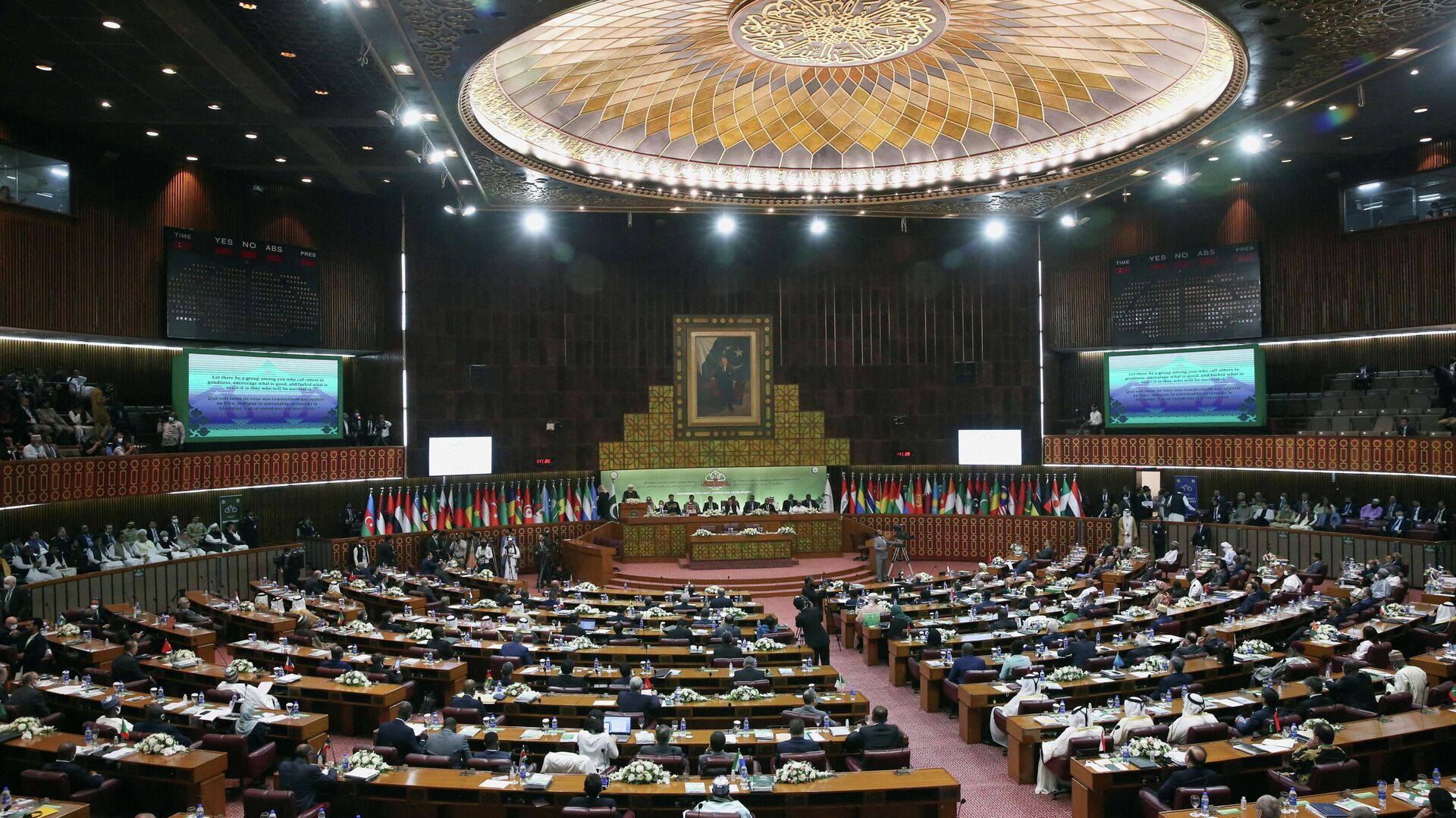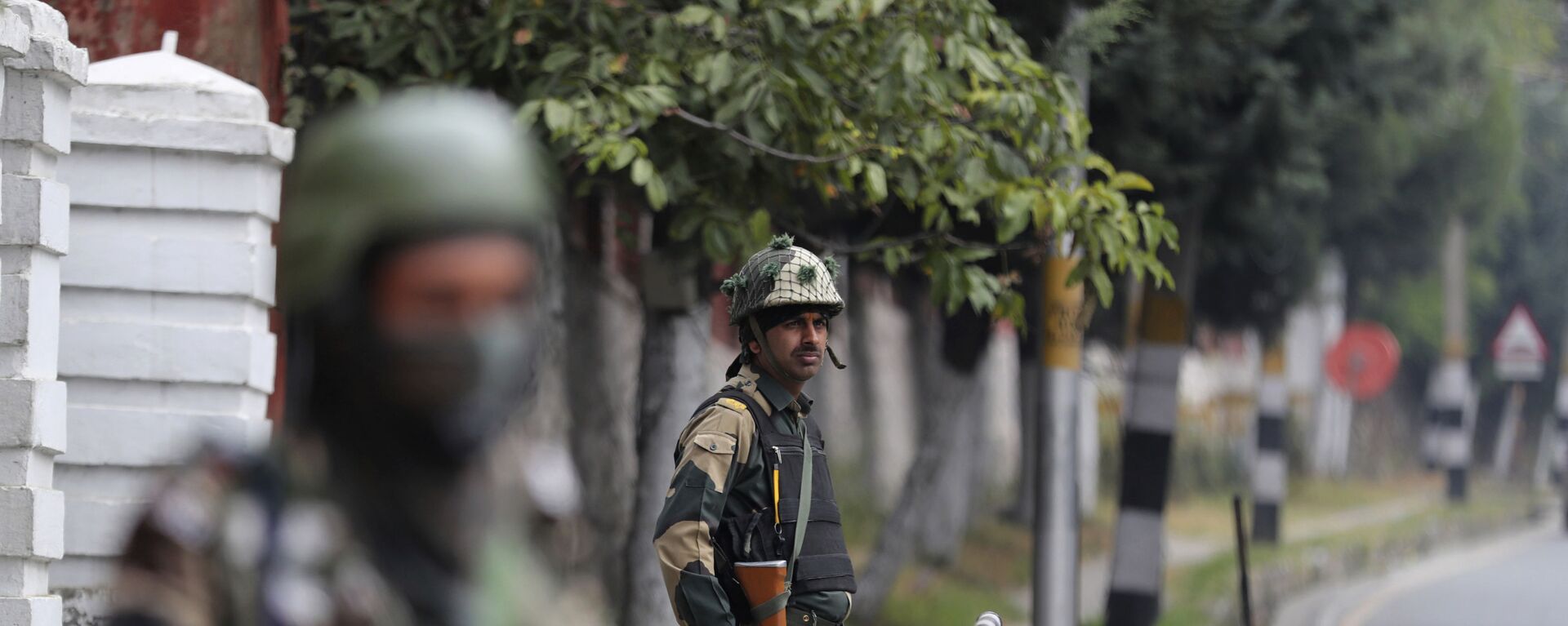https://sputnikglobe.com/20220323/political-pundits-doubt-islamic-nations-meeting-can-facilitate-india-pakistan-reconciliation-1094115196.html
Political Pundits Doubt Islamic Nations' Meeting Can Facilitate India-Pakistan Reconciliation
Political Pundits Doubt Islamic Nations' Meeting Can Facilitate India-Pakistan Reconciliation
Sputnik International
The 48th conference of foreign ministers of the Organisation of Islamic Cooperation (OIC) is the first meeting held after the Taliban’s* takeover of... 23.03.2022, Sputnik International
2022-03-23T12:29+0000
2022-03-23T12:29+0000
2022-12-08T18:02+0000
kashmir
pakistan
organization of islamic cooperation (oic)
organisation of islamic cooperation (oic)
political party
delhi
new delhi
islamabad
sputnik
https://cdn1.img.sputnikglobe.com/img/07e6/03/17/1094117753_0:159:3359:2048_1920x0_80_0_0_1f073e96afb5b4ab6ed1b74525b20258.jpg
Raising Kashmir as an issue of concern at the 48th conference of foreign ministers of Islamic nations in Islamabad, the OIC has evoked a mixed response from politicians and local political observers in India’s union territory of Jammu and Kashmir.While the OIC has advocated the need to hold a dialogue between India and Pakistan, some politicians and experts in India-administered Kashmir expressed doubts about discussions at the latest meeting held in Pakistan’s capital city going anywhere.Senior member of the Jammu and Kashmir Peoples Democratic Party Naeem Akhtar said the statements made at the OIC conference in the past haven’t led to anything fruitful for Jammu and Kashmir as yet.PDP politician Akhtar also favoured holding bilateral talks, as he said: “It is now time the Prime Minister's Office take a fresh look at our policies and let India take its natural role of leadership in South Asia and resolve the Kashmir issue with Pakistan."Akhtar added that "instead of India being bracketed with the United States or China", it is time for the country to "take centrestage, establish its independent stance and unveil its true potential”.In a statement issued by the OIC Contact Group on Jammu and Kashmir, Secretary General Hissein Brahim Taha was quoted as saying that the “conflict of Jammu and Kashmir continues without any signs of solution”.Taha also said that the OIC reflected “full solidarity of the Muslim world with the people of Kashmir in its struggle for self-determination”. Taha also stressed the need for a “dialogue to achieve a peaceful solution to the long-standing conflict”.A Kashmir-based politician, however, said that the OIC wasn't "helpful" vis-à-vis Kashmir.“OIC has never been helpful with regard to Kashmir. We are a votary for holding India-Pakistan talks but the onus lies on Pakistan to create a conducive environment for talks. Bilateral talks are the key,” said Tanvir Sadiq, chief spokesperson of Kashmir’s National Conference party.Scepticism OIC Has Any Major InfluenceSome of the political watchers based in the Kashmir region expressed doubts regarding OIC’s possibility to play a bigger role.According to Prof. Sheikh Showkat Hussain, OIC is the second largest forum after the United Nations. But despite having huge potential, it remains as inactive as the UN.On Tuesday, Pakistani Prime Minister Imran Khan, while delivering a keynote address, said, “We have failed both the Palestinians and the people of Kashmir. I am sad to say that we have been able to make no impact at all."While referring to the Muslim nations’ group (OIC), he further stated that Western countries "did not take the OIC seriously" because "we are a divided house and those powers know it”.Since February 2021, India and Pakistan have been observing a ceasefire at the Line of Control between the two neighbouring countries. Both Delhi and Islamabad claim Kashmir region in its entirety, but control it partially.*The Taliban is an organisation under UN sanctions for terrorist activities.
https://sputnikglobe.com/20220321/gulf-nations-delegation-visits-jammu-and-kashmir-ahead-of-oic-meeting-in-pakistan-1094041110.html
kashmir
pakistan
delhi
new delhi
islamabad
Sputnik International
feedback@sputniknews.com
+74956456601
MIA „Rosiya Segodnya“
2022
Sputnik International
feedback@sputniknews.com
+74956456601
MIA „Rosiya Segodnya“
News
en_EN
Sputnik International
feedback@sputniknews.com
+74956456601
MIA „Rosiya Segodnya“
Sputnik International
feedback@sputniknews.com
+74956456601
MIA „Rosiya Segodnya“
kashmir, pakistan, organization of islamic cooperation (oic), organisation of islamic cooperation (oic), political party, delhi, new delhi, islamabad, sputnik
kashmir, pakistan, organization of islamic cooperation (oic), organisation of islamic cooperation (oic), political party, delhi, new delhi, islamabad, sputnik
Political Pundits Doubt Islamic Nations' Meeting Can Facilitate India-Pakistan Reconciliation
12:29 GMT 23.03.2022 (Updated: 18:02 GMT 08.12.2022) The 48th conference of foreign ministers of the Organisation of Islamic Cooperation (OIC) is the first meeting held after the Taliban’s* takeover of Afghanistan last August.
Raising Kashmir as an issue of concern at the 48th conference of foreign ministers of Islamic nations in Islamabad, the OIC has evoked a mixed response from politicians and local political observers in India’s union territory of
Jammu and Kashmir.
While the OIC has advocated the need to hold a dialogue between India and
Pakistan, some politicians and experts in India-administered Kashmir expressed doubts about discussions at the latest meeting held in Pakistan’s capital city going anywhere.
Senior member of the Jammu and Kashmir Peoples Democratic Party Naeem Akhtar said the statements made at the OIC conference in the past haven’t led to anything fruitful for Jammu and Kashmir as yet.
“Any statement aimed to resolve Kashmir is welcomed. However, in the past, statements have rarely translated into something positive,” Akhtar, who is also a former cabinet minister of the erstwhile Jammu and Kashmir state government, told Sputnik while reacting to the mention of Kashmir at the OIC meeting.
PDP politician Akhtar also favoured holding bilateral talks, as he said: “It is now time the
Prime Minister's Office take a fresh look at our policies and let India take its natural role of leadership in South Asia and resolve the Kashmir issue with Pakistan."
Akhtar added that "instead of India being bracketed with the United States or China", it is time for the country to "take centrestage, establish its independent stance and unveil its true potential”.
In a statement issued by the OIC Contact Group on Jammu and Kashmir, Secretary General Hissein Brahim Taha was quoted as saying that the “conflict of Jammu and Kashmir continues without any signs of solution”.
Taha also said that the OIC reflected “full solidarity of the Muslim world with the people of Kashmir in its struggle for self-determination”. Taha also stressed the need for a “dialogue to achieve a peaceful solution to the long-standing conflict”.
A Kashmir-based politician, however, said that the OIC wasn't "helpful" vis-à-vis Kashmir.
“OIC has never been helpful with regard to Kashmir. We are a votary for holding India-Pakistan talks but the onus lies on Pakistan to create a conducive environment for talks. Bilateral talks are the key,” said Tanvir Sadiq, chief spokesperson of Kashmir’s National Conference party.
Scepticism OIC Has Any Major Influence
Some of the political watchers based in the Kashmir region expressed doubts regarding OIC’s possibility to play a bigger role.
According to Prof. Sheikh Showkat Hussain, OIC is the second largest forum after the United Nations. But despite having huge potential, it remains as inactive as the UN.
“However, being a forum of 57 countries, it may have an important role to play in the current global situation where the Muslim countries have concerns of being targeted by western powers and American dominance,” he added.
On Tuesday, Pakistani Prime Minister Imran Khan, while delivering a keynote address, said, “We have failed both the Palestinians and the people of Kashmir. I am sad to say that we have been able to make no impact at all."
While referring to the Muslim nations’ group (OIC), he further stated that Western countries "did not take the OIC seriously" because "we are a divided house and those powers know it”.
Since February 2021, India and Pakistan have been observing a ceasefire at the Line of Control between the two neighbouring countries. Both Delhi and Islamabad claim Kashmir region in its entirety, but control it partially.
*The Taliban is an organisation under UN sanctions for terrorist activities.




